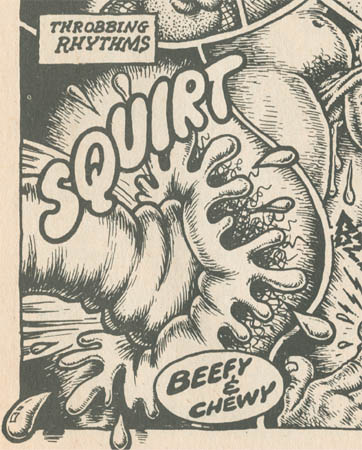
Despite being a major catalyst for the underground artists in San Francisco, Crumb always felt like an outsider—uncomfortable with all the pseudo-spirituality and hippie ethics. To him it was simply a way of meeting girls, or more specifically, girls with big butts. “All my life I’ve been a slave to that butt,” the artist revealed in Crumb and Peter Poplaski’s R. Crumb Handbook. “The motion of a big, round, human female butt while she’s walking has the same effect that the blossom has on the bee. To see is to desire! It’s primal.”
Crumb was raised a good Catholic and initially kept his faith, but over the years he drifted away from the flock. However, his Catholic urge to confess stayed with him for life, as he redirected his declarations of guilt from the confessional to the comic page. Crumb developed the “confessional comic,” where he could purge his soul of all his dark sexual thoughts for the “entertainment” of the public. This form of semi-autobiographical comic continues to be popular, with creations such as Chester Brown’s I Never Liked You and Joe Matt’s angst-ridden Peep Show strip, which reveals his excessive masturbatory habits.
“All my natural compulsions are perverted and twisted. Instead of going out and challenging myself against other males, all those impulses are channeled into sex,” recalled Crumb. “That’s why I want to ravage big women, that’s how I get out all my aggressions, and fortunately I’ve found lots of women who like that! Oh thank the gods!”
Crumb’s comic antics were egged on by his cartoonists-in-arms, S. Clay Wilson and Robert Williams. These two “bad boys” were determined to push the boundaries of comic content, and urged Crumb to break as many taboos as possible. The cartoonist didn’t need much encouragement, and he was soon producing startling and shocking material.
In 1968, Crumb started Snatch Comics, and went straight for the jugular with full-page spreads such as The Grand Opening of the Great Intercontinental Fuck-in and Orgy-Riot, and The Family That Lays Together, Stays Together. The latter image was simply a warm-up for his infamous Joe Blow strip in Zap #4, which portrayed an incestuous family.
The flak that Crumb received for these strips cannot be overstated. Copies of Zap were seized by the San Francisco police and it was banned completely in New York. As fellow Zap cartoonist Victor Moscoso recalled, “I never did an incest story and Crumb never did an incest story again, as far as I know. However, we did not self-censor ourselves; it was just after a while we got it out of our systems.”
Robert Crumb gets down to basics in the strip All Meat Comics, from Big Ass Comix #1.
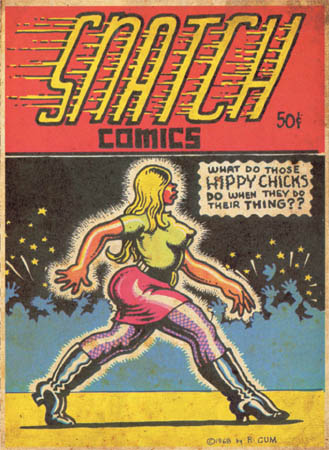
Snatch Comics #1 features Crumb’s idealized woman on the cover and was siezed by police in January 1969. Note the signature, R. Cum.

Honeybunch Kaminski, the drug-crazed runaway from U Needa Comix (1970).
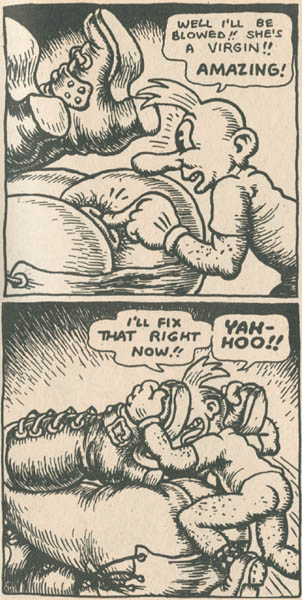
This strip from Big Ass Comics #1 was reworked by Oz magazine in the U.K., who put Rupert the Bear’s head on the character without Crumb’s permission. The result saw them taken to court on obscenity charges.
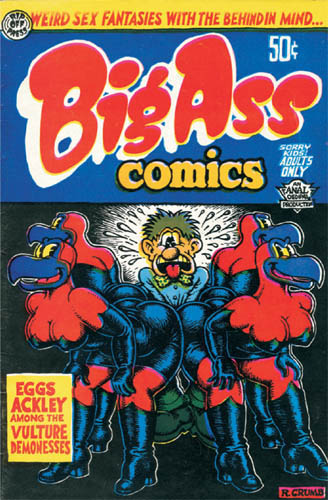
Cover to Big Ass Comics #1 by Robert Crumb.
Crumb’s massive list of comics continued to be more and more controversially named, upping the ante from Jiz to the nadir of Cunt Comics, which proclaimed it was “The only comic you can eat!” Most of these titles only ever made it to two or three issues as police pressure was constantly applied to the retailers—mostly head shops—that stocked them.
Crumb’s huge roster of characters included the massively popular Fritz the Cat, an oversexed “funny animal” and a cynical parody of the free-loving ’60s. The strips were turned into the first full-length, X-rated animated movie in 1972, which Crumb denounced as a travesty.
Another recurring character was the deliberately racist, oversexed Angelfood McSpade, a black woman with an Amazonian body who is constantly molested by smaller white men. One character that became very popular was Honeybunch Kaminski, “The Drug-Crazed Runaway.” The character was bizarrely prescient of Aline Kominsky, a female cartoonist who later became involved with Crumb and would ultimately marry him (after first being chased off the commune by Dana with a shotgun).
Women attacked Robert Crumb regularly for his portrayal of them in his strips, but much of Crumb’s misogyny at the time came from misdirected anger. He had an adoring public, which appealed and repulsed him simultaneously, and his comics tested his devoted fans: “They love me so much, let’s see if they can handle this.” But even this couldn’t last. Crumb’s guilt caught up with him when he confessed—self-mockingly—on the BBC’s 1987 Arena documentary, “Yeah, I guess you could say I’m a sexist. I’ve tried to raise my consciousness, God knows… I have this reccurring vision that I’m standing in front of this tribunal of feminist women and I’m answering for my exploitation of women in my cartoons. And the only answer I have is that I’m telling the truth about myself, for better or worse. Take it or leave it.”
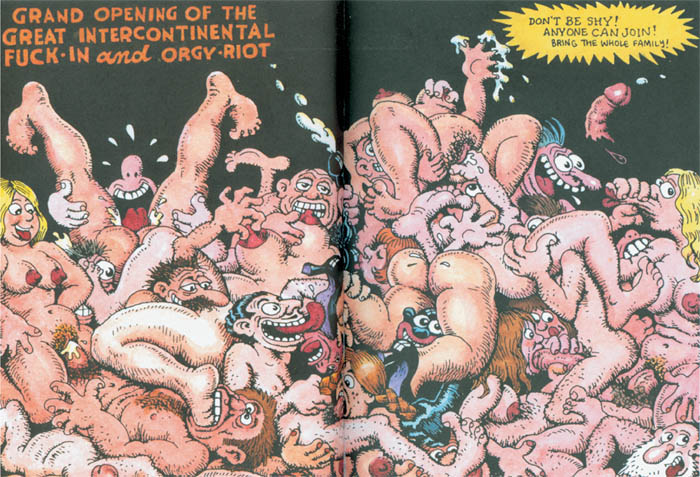
The drawing that caused controversy, The Grand Opening of the Great Intercontinental Fuck-in and Orgy-Riot, featured several Crumb characters including Angelfood McSpade and Mr. Natural.